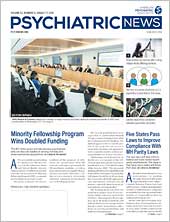Enhancing diversity of the psychiatric workforce and countering prejudice in the community will be topics of discussion at this year’s IPS: The Mental Health Services Conference in Chicago.
“Workforce Inclusion: Roadblocks and Relevance of Black Men in Psychiatry” will look at how increased diversity within a physician workforce can help address health disparities in minority and underserved communities. One topic is APA’s Black Men in Psychiatry Pipeline Program, which seeks to recruit undergraduate black men who are thinking about medical school.
The symposium will be co-chaired by Chicago community psychiatrist Carl Bell, M.D., and Rahn Bailey, M.D., the APA Assembly representative from the Caucus of Black Psychiatrists.
Bell told Psychiatric News that black and other minority psychiatrists of his generation know the obstacles that stand in the way of greater diversity in medicine.
He related his own experience as an undergraduate with a plan to graduate early from college and attend medical school. “I told my plan to a college advisor who happened to be a white male,” Bell said. “He suggested that I go for something more reasonable like auto mechanics. I tore up his suggestions as soon as I left his office and took the courses that ultimately helped me to finish college in two years and go to medical school.
“He was the antipathy of workforce inclusion, not to mention perpetrating a microaggression that would have kept me from medical school,” Bell said.
According to the Association of American Medical Colleges (AAMC), black men make up 2.6 percent of the nation’s psychiatric workforce compared with 36 percent for white men. From 1978 to 2014, the number of black men matriculating into U.S. medical schools decreased by 5 percent.
The symposium will address the social and academic support systems needed to recruit black men into psychiatry and support them while highlighting APA programming that addresses their shortage in the profession. In unpacking APA’s fourth strategic initiative—”Supporting and increasing diversity within APA”—this session will draw on the experiences and insight of black men who are in the psychiatric workforce and the challenges they have encountered. The format will encompass role playing, lectures, and other interactive strategies to facilitate the development of practical solutions.
Included among the speakers at the symposium is Norman Harris, a student at Howard University who is in APA’s Black Men in Psychiatry Pipeline Program (
Psychiatric News, May 4). The program grew out of the AAMC’s 2015 report “Altering the Course: Black Males in Medicine.” It began as a pilot at Howard University and has been expanded to other colleges and universities; it now includes seven men.
As a participant in the program, Harris receives mentoring (from APA President Altha Stewart, M.D.) and has attended the annual meetings of APA and the American Academy of Child and Adolescent Psychiatry, as well as the meeting of the Black Psychiatrists of America in Memphis in April.
The IPS will also feature the symposium “Microaggression and Strategies to Overcome Prejudice,” co-chaired by Bell and Ranna Parkekh, M.D., director of APA’s Division of Diversity and Health Equity. In 1970, psychiatrist Chester Pierce, M.D., coined the term “microaggression” to describe an everyday, subtle form of discrimination experienced by African Americans. The term now applies to all minorities and marginalized groups.
Bell and Parekh will outline various types of microaggressions and their impact on the treatment of patients and on working with minority medical professionals. And they will offer strategies to overcome prejudice. The panel will provide real-life examples and effective practices to eliminate and combat bias. ■
IPS registration and housing information can be accessed
here. The site also contains full descriptions of all sessions.

